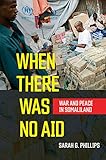When There Was No Aid : War and Peace in Somaliland / Sarah G. Phillips.
Material type: TextPublisher: Ithaca, NY : Cornell University Press, [2020]Copyright date: ©2020Description: 1 online resource (256 p.) : 1 mapContent type:
TextPublisher: Ithaca, NY : Cornell University Press, [2020]Copyright date: ©2020Description: 1 online resource (256 p.) : 1 mapContent type: - 9781501747151
- 9781501747168
- Humanitarian intervention -- Somalia
- Peace-building -- Somaliland (Secessionist government, 1991- )
- Peace-building -- Somaliland (Secessionist government, 1991- )
- Postwar reconstruction -- Somaliland (Secessionist government, 1991- )
- Postwar reconstruction -- Somaliland (Secessionist government, 1991- )
- Violence -- Somaliland (Secessionist government, 1991- )
- Violence -- Somaliland (Secessionist government, 1991- )
- African Hist & Diaspora
- Political Science & Political History
- Sociology & Social Science
- SOCIAL SCIENCE / Disasters & Disaster Relief
- Somaliland, International Development, Aid, Foreign Intervention, Conflict resolution
- 967.7305/3 23
- DT407.4
- online - DeGruyter
- Issued also in print.
| Item type | Current library | Call number | URL | Status | Notes | Barcode | |
|---|---|---|---|---|---|---|---|
 eBook
eBook
|
Biblioteca "Angelicum" Pont. Univ. S.Tommaso d'Aquino Nuvola online | online - DeGruyter (Browse shelf(Opens below)) | Online access | Not for loan (Accesso limitato) | Accesso per gli utenti autorizzati / Access for authorized users | (dgr)9781501747168 |
Frontmatter -- Contents -- Acknowledgments -- Brief Timeline of Events -- A Note on Spellings -- Introduction: What if We Don't Intervene? -- 1. The Imperative of Intervention -- 2. Somaliland's Relative Isolation -- 3. Self-Reliance and Elite Networks -- 4. Local Ownership and the Rules of the Game -- 5. War and Peace in the Independence Discourse -- Conclusion: Why Aid Matters Less than We Think -- Notes -- References -- Index
restricted access online access with authorization star
http://purl.org/coar/access_right/c_16ec
For all of the doubts raised about the effectiveness of international aid in advancing peace and development, there are few examples of developing countries that are even relatively untouched by it. Sarah G. Phillips's When There Was No Aid offers us one such example.Using evidence from Somaliland's experience of peace-building, When There Was No Aid challenges two of the most engrained presumptions about violence and poverty in the global South. First, that intervention by actors in the global North is self-evidently useful in ending them, and second that the quality of a country's governance institutions (whether formal or informal) necessarily determines the level of peace and civil order that the country experiences.Phillips explores how popular discourses about war, peace, and international intervention structure the conditions of possibility to such a degree that even the inability of institutions to provide reliable security can stabilize a prolonged period of peace. She argues that Somaliland's post-conflict peace is grounded less in the constraining power of its institutions than in a powerful discourse about the country's structural, temporal, and physical proximity to war. Through its sensitivity to the ease with which peace gives way to war, Phillips argues, this discourse has indirectly harnessed an apparent propensity to war as a source of order.
Issued also in print.
Mode of access: Internet via World Wide Web.
In English.
Description based on online resource; title from PDF title page (publisher's Web site, viewed 02. Mrz 2022)


